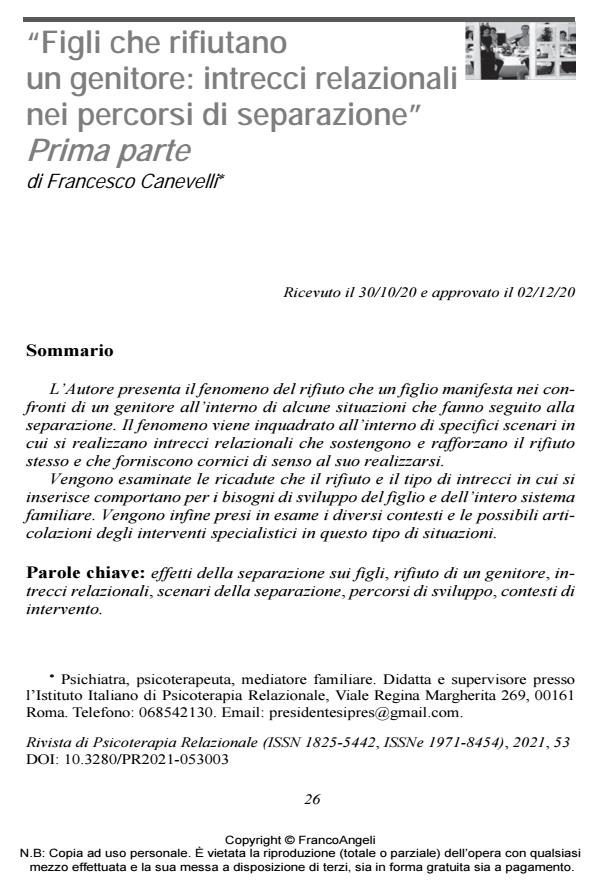"Children who reject a parent: intertwining relationships within separation experiences". First part
Journal title RIVISTA DI PSICOTERAPIA RELAZIONALE
Author/s Francesco Canevelli
Publishing Year 2021 Issue 2021/53 Language Italian
Pages 22 P. 26-47 File size 223 KB
DOI 10.3280/PR2021-053003
DOI is like a bar code for intellectual property: to have more infomation
click here
Below, you can see the article first page
If you want to buy this article in PDF format, you can do it, following the instructions to buy download credits

FrancoAngeli is member of Publishers International Linking Association, Inc (PILA), a not-for-profit association which run the CrossRef service enabling links to and from online scholarly content.
The Author addresses the phenomenon of parental refusal that a child may manifest in some situations following separation. The issue is framed within specific scenarios in which emerging intertwining rela-tionships support and reinforce the refusal itself and provide frames of meaning for its occurrence. The implications that the refusal and the type of relationships in which it entails have on the development needs of the child and on the entire family system are examined. Finally, the various contexts and possible specialist interventions in this type of sit-uation are discussed.
Keywords: Effects of separation on children, refusal of a parent, in-tertwining relationships, separation scenarios, development paths, contexts of intervention.
- APA American Psychiatric Association (2013). Diagnostic and statistical manual of mental disorders, fifth edition, DSM-5. Arlington: American Psychiatric Publishing (trad. it.: Manuale Diagnostico e Statistico dei disturbi mentali, quinta edizione, DSM-5. Milano: Cortina, 2014).
- Boszormenyi-Nagy I., Spark G.M. (1988). Lealtà invisibili. La reciprocità nella terapia fa miliare intergenerazionale. Roma: Astrolabio.
- Canevelli F., Lucardi M. (2000). La mediazione familiare. Dalla rottura del legame al riconoscimento dell’altro. Torino: Bollati Boringhieri.
- Canevelli F., Lucardi M. (2019). Coppie in mediazione. Legami, conflitti, riconoscimenti. Roma: Apertamenteweb.
- Cigoli V. (1998). Psicologia della separazione e del divorzio. Bologna: il Mulino.
- Gardner R.A. (1985). Recent Trends in Divorce and Custody Litigation. The Aca demy Fo rum (A Publication of the American Academy of Psychoanalysis), 29, 2: 3-7.
- Ivaldi A. (2004). Il triangolo drammatico: da strumento descrittivo a strumento terapeutico. Cognitivismo Clinico, 1, 2: 108-123.
- Karpman S.B. (1968). Fairy tales and script drama analysis. Transational Analysis Bulletin, 7: 39-43.
- Liotti G., Farina B. (2011). Sviluppi traumatici. Epistemologia, clinica e terapia della dimensione dissociativa. Milano: Raffaello Cortina.
- Lucardi M. (1991). Separazione e affidamento: genitori e figli nella rappresentazione dei magistrati. Tesi di dottorato. Roma, Università La Sapienza.
- Meadow R. (1977). Munchausen syndrome by proxy-the hinterland of child abuse. Lancet, 310: 343-345. DOI: 10.1016/s0140-6736(77)91497-0
- Santi G. (1983). Separazione e divorzio in una prospettiva psicogiuridica in Cigoli V., Gulotta G., Santi G. Separazione, divorzio e affidamento dei figli. Milano: Giuffré.
- SINPIA Soc. It. di Neuropsichiatria dell’infanzia e dell’adolescenza (2007). Linee guida in tema di abuso sui minori.
Francesco Canevelli, "Figli che rifiutano un genitore: intrecci relazionali nei percorsi di separazione" Prima parte in "RIVISTA DI PSICOTERAPIA RELAZIONALE " 53/2021, pp 26-47, DOI: 10.3280/PR2021-053003